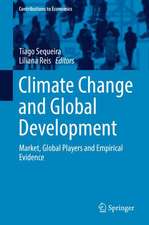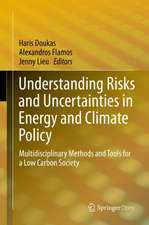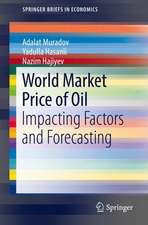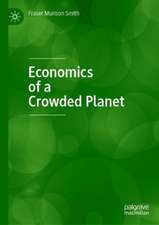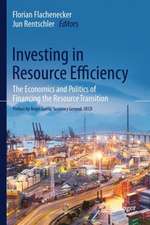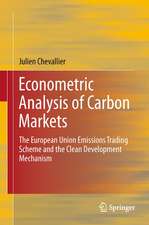Pricing and Forecasting Carbon Markets: Models and Empirical Analyses
Autor Bangzhu Zhu, Julien Chevallieren Limba Engleză Paperback – 28 iul 2018
By integrating the features of analytical systems, it offers insights to further our scientific understanding of the pricing mechanism and the variable laws governing the carbon market. Moreover, it lays a foundation for dealing with climate change in China and constructing a national carbon market there. Ultimately, it actively contributes to the energy saving and CO2 emission reduction promoted by the carbon market.
The carbon market, represented by the European Union Emissions Trading System (EU ETS), is a cost-effective measure for tackling climate change. Furthermore, pricing and forecasting carbon market has been one of the research focuses in the fields of energy and climate change. As a policy tool of the trading mechanism, the carbon market offers a great institutional innovation for coping with climate change. Due to its multiple advantages including saving costs and environment protection, and political feasibility, more and more countries including China have applied the carbon market for carbon dioxide (CO2) emission reduction. Accurately understanding the pricing mechanism and mastering the fluctuating law of carbon market is essential to build a national carbon market for China.
| Toate formatele și edițiile | Preț | Express |
|---|---|---|
| Paperback (1) | 490.67 lei 38-44 zile | |
| Springer International Publishing – 28 iul 2018 | 490.67 lei 38-44 zile | |
| Hardback (1) | 604.37 lei 22-36 zile | |
| Springer International Publishing – 18 mai 2017 | 604.37 lei 22-36 zile |
Preț: 490.67 lei
Preț vechi: 605.76 lei
-19% Nou
Puncte Express: 736
Preț estimativ în valută:
93.89€ • 98.29$ • 77.69£
93.89€ • 98.29$ • 77.69£
Carte tipărită la comandă
Livrare economică 02-08 aprilie
Preluare comenzi: 021 569.72.76
Specificații
ISBN-13: 9783319862095
ISBN-10: 331986209X
Pagini: 168
Ilustrații: XX, 168 p. 40 illus., 26 illus. in color.
Dimensiuni: 155 x 235 mm
Ediția:Softcover reprint of the original 1st ed. 2017
Editura: Springer International Publishing
Colecția Springer
Locul publicării:Cham, Switzerland
ISBN-10: 331986209X
Pagini: 168
Ilustrații: XX, 168 p. 40 illus., 26 illus. in color.
Dimensiuni: 155 x 235 mm
Ediția:Softcover reprint of the original 1st ed. 2017
Editura: Springer International Publishing
Colecția Springer
Locul publicării:Cham, Switzerland
Cuprins
Chapter 1. (Introduction) On the forecasting ability of carbon prices.- Chapter 2. Analytical tools for determining equilibrium values and crises detection in carbon markets.- Chapter 3. Iterative cumulative sums of squares algorithm and event study models applied to the carbon market.- Chapter 4. Empirical Mode Decomposition techniques for carbon price analysis.- Chapter 5. Zipf analysis for analyzing speculators’ behavior on the carbon market.- Chapter 6. Linear and non-linear combinatory models for carbon price forecasting.- Chapter 7. Hybrid models for carbon price forecasting.- Chapter 8. Improving carbon price forecasting accuracy by resorting to combinatorial optimization.- Chapter 9. Multiscale prediction models for carbon prices.- Chapter 10. Ensemble learning paradigm with kernel function prototype for carbon pricing.
Notă biografică
Dr. Bangzhu Zhu is a Professor of Management Science & Engineering at Jinan University, Guangzhou, China. His research interest includes energy and carbon markets, energy economy and climate policy, and big data mining. Dr. Zhu received his postdoctor, Ph.D. and M.Sc. in Management Science & Engineering respectively from the Beijing Institute of Technology in 2012, Beijing University of Aeronautics and Astronautics in 2008, and Guilin University of Electronic Technology in 2004, and his Bachelor of Engineering in Industry Engineering from the Zhengzhou Institute of Aeronautical Industry Management in 1999. Dr. Zhu has a visiting research position at the Beijing Jiaotong University.
Dr. Zhu has published articles in leading refereed journals, including the Omega, Ecological Economics and Journal of Forecasting. He also won respectively the Guangdong Young Zhujiang Scholar, Natural ScienceFoundation for Distinguished Young Talents of Guangdong, 1000-100-10 talent project and outstanding young teacher project of Guangdong, China in 2016, 2014, 2012 and 2014.
Dr. Julien Chevallier is a Tenured Associate Professor of Economics (Professeur des Universités) and Director of the MSc Money, Banking, Finance & Insurance. He undertakes research and lectures on empirical finance, applied time-series econometrics, and commodity markets. Dr. Chevallier received his Ph.D. in Economics from the University Paris West in 2008, and his M.Sc. in Economics from the London School of Economics in 2005. Dr. Chevallier has previously held visiting research positions at the Imperial College Business School (London), at the Centre for Economic Performance (London School of Economics), at Georgetown University, and at the World Bank (Washington DC). Dr. Chevallier is the author of the book Econometric Analysis of Carbon Markets (Springer), as wellas the co-author of the book The Economics of Commodity Markets (Wiley Finance). He has published articles in leading refereed journals, including the International Review of Financial Analysis, Journal of International Financial Markets, Institutions & Money and Quantitative Finance. Furthermore, Dr. Chevallier currently serves as Associate Editor at Energy Economics among other appointments.
Julien Chevallier is a pioneer in the empirical research on currently working emissions trading schemes, an instrument originally developed in environmental economics. In particular, his work has focused on the performance of the European Union Emissions Trading Scheme. Dr. Chevallier applies modern financial econometrics tools to examine a broad set of topics related to emissions trading and its theory. His research includes topics, such as drivers and structural changes in carbon prices, the informational efficiency of EU ETS, and cross-market linkagesbetween emissions trading and energy markets. His work provides deeps insight on how to examine risk components in carbon prices and impacts of risks and risk aversion in a trading market where borrowing is possible.
Dr. Chevallier is the 2015 David Pearce Keynote Speaker at the the Annual EAERE conference held in Helsinki (Finland), on the topic “Emissions trading: lessons from the theory and empirics”.
Dr. Zhu has published articles in leading refereed journals, including the Omega, Ecological Economics and Journal of Forecasting. He also won respectively the Guangdong Young Zhujiang Scholar, Natural ScienceFoundation for Distinguished Young Talents of Guangdong, 1000-100-10 talent project and outstanding young teacher project of Guangdong, China in 2016, 2014, 2012 and 2014.
Dr. Julien Chevallier is a Tenured Associate Professor of Economics (Professeur des Universités) and Director of the MSc Money, Banking, Finance & Insurance. He undertakes research and lectures on empirical finance, applied time-series econometrics, and commodity markets. Dr. Chevallier received his Ph.D. in Economics from the University Paris West in 2008, and his M.Sc. in Economics from the London School of Economics in 2005. Dr. Chevallier has previously held visiting research positions at the Imperial College Business School (London), at the Centre for Economic Performance (London School of Economics), at Georgetown University, and at the World Bank (Washington DC). Dr. Chevallier is the author of the book Econometric Analysis of Carbon Markets (Springer), as wellas the co-author of the book The Economics of Commodity Markets (Wiley Finance). He has published articles in leading refereed journals, including the International Review of Financial Analysis, Journal of International Financial Markets, Institutions & Money and Quantitative Finance. Furthermore, Dr. Chevallier currently serves as Associate Editor at Energy Economics among other appointments.
Julien Chevallier is a pioneer in the empirical research on currently working emissions trading schemes, an instrument originally developed in environmental economics. In particular, his work has focused on the performance of the European Union Emissions Trading Scheme. Dr. Chevallier applies modern financial econometrics tools to examine a broad set of topics related to emissions trading and its theory. His research includes topics, such as drivers and structural changes in carbon prices, the informational efficiency of EU ETS, and cross-market linkagesbetween emissions trading and energy markets. His work provides deeps insight on how to examine risk components in carbon prices and impacts of risks and risk aversion in a trading market where borrowing is possible.
Dr. Chevallier is the 2015 David Pearce Keynote Speaker at the the Annual EAERE conference held in Helsinki (Finland), on the topic “Emissions trading: lessons from the theory and empirics”.
Textul de pe ultima copertă
This book applies the multidisciplinary approaches of econometrics, statistics, finance and artificial intelligence for pricing and forecasting the carbon market in the context of managerial issues. It explores the related issues of pricing and forecasting the carbon market using theoretical models and empirical analyses, demonstrating how the carbon market, as a policy-based artificial market, is complex and influenced by both the market mechanisms and the external heterogeneous environments.
By integrating the features of analytical systems, it offers insights to further our scientific understanding of the pricing mechanism and the variable laws governing the carbon market. Moreover, it lays a foundation for dealing with climate change in China and constructing a national carbon market there. Ultimately, it actively contributes to the energy saving and CO2 emission reduction promoted by the carbon market.
The carbon market, represented by the European Union Emissions Trading System (EU ETS), is a cost-effective measure for tackling climate change. Furthermore, pricing and forecasting carbon market has been one of the research focuses in the fields of energy and climate change. As a policy tool of the trading mechanism, the carbon market offers a great institutional innovation for coping with climate change. Due to its multiple advantages including saving costs and environment protection, and political feasibility, more and more countries including China have applied the carbon market for carbon dioxide (CO2) emission reduction. Accurately understanding the pricing mechanism and mastering the fluctuating law of carbon market is essential to build a national carbon market for China.
By integrating the features of analytical systems, it offers insights to further our scientific understanding of the pricing mechanism and the variable laws governing the carbon market. Moreover, it lays a foundation for dealing with climate change in China and constructing a national carbon market there. Ultimately, it actively contributes to the energy saving and CO2 emission reduction promoted by the carbon market.
The carbon market, represented by the European Union Emissions Trading System (EU ETS), is a cost-effective measure for tackling climate change. Furthermore, pricing and forecasting carbon market has been one of the research focuses in the fields of energy and climate change. As a policy tool of the trading mechanism, the carbon market offers a great institutional innovation for coping with climate change. Due to its multiple advantages including saving costs and environment protection, and political feasibility, more and more countries including China have applied the carbon market for carbon dioxide (CO2) emission reduction. Accurately understanding the pricing mechanism and mastering the fluctuating law of carbon market is essential to build a national carbon market for China.
Caracteristici
Offers a step-by-step description of advanced forecasting techniques for the carbon price With empirical emphasis for practical policy guidance One-stop shop for practitioners pressed by time to update their knowledge on carbon price forecasting Includes supplementary material: sn.pub/extras Includes supplementary material: sn.pub/extras






